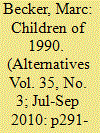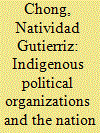|
|
|
Sort Order |
|
|
|
Items / Page
|
|
|
|
|
|
|
| Srl | Item |
| 1 |
ID:
101762


|
|
|
|
|
| Publication |
2010.
|
| Summary/Abstract |
In June 1990, the Confederation of Indigenous Nationalities of Ecuador (CONAIE) led a massive uprising against their social, economic, and political marginalization. The protest altered the political landscape of Ecuador and gave that country a reputation as home to some of the strongest and best-organized social movements in South America. Two decades later-this year, 2010-the children of the leaders of that historic uprising continued to lead mobilizations against the government. This time, however, Rafael Correa, whom many saw as emblematic of Latin America's shift to the left, was in power. What explains indigenous protest against a leftist government? Was Correa not a true leftist, as some militants alleged? Or was this yet another example of a white urban left failing to take the concerns of rural indigenous communities into account? Recent developments point to an alternative explanation: Indigenous movements have become more conservative and have discarded a strategy of building coalitions that had brought them so much success in the twentieth century.
|
|
|
|
|
|
|
|
|
|
|
|
|
|
|
|
| 2 |
ID:
101757


|
|
|
| 3 |
ID:
101760


|
|
|
|
|
| Publication |
2010.
|
| Summary/Abstract |
The growing visibility of indigenous political organizations and activism in Latin America has a variety of claims and methods to interrelate with the state and organized civil society. These claims are framed within the logic of development and state construction; thus, these political projects fueled by ethnic actors do not have a secessionist outlook. This article addresses the different types of ethnic conflict current in Latin America. It also discusses the practical experience of implementing rights of autonomy. By highlighting the frequent types of ethnic conflict and their prevalence, the author looks forward to proposing a comparative model to explain the different routes taken by the construction of an inclusive, plurinational state led by ethnic actors. The article derives its analysis from the data bank of indigenous organizations, ORGINDAL.
|
|
|
|
|
|
|
|
|
|
|
|
|
|
|
|
| 4 |
ID:
101756


|
|
|
|
|
| Publication |
2010.
|
| Summary/Abstract |
The articles in this, the one of three special issues of Alternatives on the theme of indigenous politics in the globalizing world, deal with important questions: How are the flows of people and ideas as well as the institutions to manage them impeded or assisted by the state and other social, political, and economic institutions? What does improved knowledge and understanding of these flows contribute to how one defines an indigenous community? What role do global technologies play in linking migrant and diasporic communities to each other and to the homeland? Authors in this issue articulate the local, national, and global contexts in which indigenous identity, interests, and consciousness are constructed and reconstructed through the case studies of Australia, Taiwan, Latin America, and Hawaii and produce novel perspectives that replace conventional understanding of indigenous politics. Instead of depicting indigenous people as passive victims of neoliberalism, globalization, and technological development, these studies illuminate agency, strategies, and the subjectivity of indigenous resistance in the twenty-first century.
|
|
|
|
|
|
|
|
|
|
|
|
|
|
|
|
| 5 |
ID:
101758


|
|
|
|
|
| Publication |
2010.
|
| Summary/Abstract |
This article situates the phenomenon of indigenous cultural festivals in the context of globalization. It sees indigenous cultural performances as an assertion of rights and a call to recognition, while also embodying performative ethics that at times exceed these liberal discourses. Cultural festivals are one of the few consistently positive spaces for indigenous communities to forge and assert a more constructive view of themselves, both intergenerationally and as part of a drive for recognition and respect as distinct cultures in local, national, and international contexts. Through a comparative consideration of the Merrie Monarch Festival in Hawaii and Garma in remote northern Australia, this article argues that cultural festivals provide a potent space for intercultural accommodations to be negotiated on largely indigenous terrain. These events strengthen indigenous agency and reset the terms of cross-cultural engagements and contested sovereignties for at least the duration of these staged encounters.
|
|
|
|
|
|
|
|
|
|
|
|
|
|
|
|
| 6 |
ID:
101759


|
|
|
|
|
| Publication |
2010.
|
| Summary/Abstract |
Several of the arguments made in this article rarely appear in the existing literature of indigenousness. First, that the nature of indigenousness may not be stable. This article examines the formation and reformation process of Taiwanese indigenousness with a focus on the latter. Second, the driving force of indigenousness might be economic. This article argues that the driving force of the formation process of Taiwanese indigenousness is more political than cultural, whereas that of the reformation process is more economic than political. Third, the key element of indigenousness is "attachment to the land," not "aboriginal people." In the formation process of Taiwanese indigenousness, physically residing in Taiwan was deemed important to show attachment to Taiwan. However, transmigration process influences the reformation process of the Taiwanese indigenousness so that one can show attachment through actions overseas. Fourth, in a transnational social field, new strategies to keep or reform indigenousness might be developed. This article introduces two strategies the Taiwanese government has used to ensure that Taiwanese people in China keep their attachments to Taiwan. In this article, these two strategies are named graduated sovereignty and governance of spatial movements.
|
|
|
|
|
|
|
|
|
|
|
|
|
|
|
|
| 7 |
ID:
101761


|
|
|
|
|
| Publication |
2010.
|
| Summary/Abstract |
The 1994 Zapatista rebellion in Chiapas, Mexico, illustrates "glocal" resistance to the neoliberal world order. While rooted in indigenous communities, the rebellion is best understood not in terms of essentialist identities but rather as an ongoing process of creating new social practices in resistance to domination. The sustainability of the movement depends not on the overthrow of the state, but on the effort to continually transform society. Four important contributions emerge from the experiences of the autonomous communities and municipalities in Zapatista-influenced territory: (1) The reframing of the concept of power. (2) The construction of new social subjectivities. (3) A redefinition of the concept of autonomy. (4) Radical democracy.
|
|
|
|
|
|
|
|
|
|
|
|
|
|
|
|
|
|
|
|
|